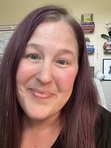Elora Nicole Ramirez's Blog, page 14
October 5, 2014
day five: repeat after me, I AM AN AUTHOR

author |ˈôTHər| (abbr.: auth.)
noun
a writer of a book, article, or report
"Someone told me I had to have a publisher in order to be an author."
I was talking with a friend when she dropped this bombshell. My eyes widened.
"No. Lies," I sputtered.
"I know, it's just hard to take this seriously when there's no one waiting for me to finish this book except for myself..."
We need to have a conversation about legitimacy.
I've had similar things happen to me — well meaning people attempt to distinguish between the ranks of published and indie. And it doesn't just stretch to indie authors. After I released Come Alive with the publisher, someone mentioned me to family saying, "she's trying really hard to be a writer. You should buy her books."
Again: these are well meaning people. You will have others who are just mean-spirited and cause you to question humanity in general. The doubt, though? The doubt comes with the questions and comments about "well you're not technically published though, right?"
Are you on a platform for book distribution? Do you have your name on the cover of a book underneath the title? Have you typed the words THE END or pressed the last punctuation key stroke on a manuscript?
You're an author.
The title author does not only come with the approval of a publisher. Success doesn't equate to contracts and book deals and deadlines and other people saying you're awesome.
You get to decide, remember?
Think of the moment you realized you wanted to write. You tried on the label writer to see how it felt. A little like alchemy, right? Magnetic. Earthy. Illuminating. Hopeful. Like the saints of Hemingway and Stein came during the night and blessed you with the ink of those who've gone before you.
From that point on, it didn't matter what anyone said. You wrote. You spilled words and filled pages and day-dreamed about plot points and characters and poetry and every day epiphanies.
Before, there may have been people who told you that you could write or that you had a way with words, but in order for you to own it — in order for you to even wade deep enough you were considering writing a book — you had to whisper those words.
I am a writer.
Have you written a book? Say it with me: I am an author. You can go quietly at first, I understand the fear of speaking too soon.
You need to know the truth, though. You need to own it and stand on it and speak it often because there will be those moments where you see the question in the eyes of others.
Their doubt cannot change your certainty.
Only you could have written the story you wrote. nly you can claim those hours spent pouring over your laptop or journal. Only you know what it feels like to finish the book you're been trying to complete for years (or weeks, months, days — whatever).
So for those who are having difficulty with this title and believing it fits, here's what I want you to do. Remember your why? Take some time today to journal about it. Let the words wash over you completely. Until you see your worth as a writer, until you know this story is meant to be told and there are people who need to hear it, the name author won't ever really fit.
I believe in you. You are worthy of being heard. Your stories are worthy of sharing. But you have to own it for the name to really stick. Practice writing it, first. Spill your thoughts on your fears and doubts and dreams surrounding your story.
And then whisper until it sounds normal on your tongue:
I am an author. I am an author. I am an author.
Need more inspiration? Introducing Hustle & Flow: a weekly letter with artistic visioning for the everyday creative. I would love it if you signed up, and I won't ever spam you. Promise.
You'll get hints and anecdotes about getting unstuck and living your most artistic life within the midst of your every day poetics. AND, if you sign up during October, you'll get some special extras dealing with indie-publishing. Come join us?
October 4, 2014
day four: the different platforms for self-publishing

In July of 2011, I had an idea.
It was fresh off reading Sarah Mae's How to Market and Sell Your eBook. I was super-inspired by her go-gettedness and knew I had a story to tell. I looked around at everyone publishing their mini-memoirs and guides and eBooks and I thought why not?
I compiled some published blog posts and filled in the gaps, telling the story of how Beauty pursued me. I'm still proud of myself for putting it out there, but it was rough copy at best. But once I was done, I had to figure out the platform. How would I get this book into people's hands?
I purchased an eCommerce package for WordPress and sold the eBook through my site. The whole process was easy enough, although it took some consistent leg work to make sure the PDF was linked correctly, the emails were being sent, and the payments were going through once purchased. Overall, it didn't work for me because of the required maintenance behind the scenes. It sold maybe ten copies. I needed something I could upload and then forget about (wrong idea, we'll deal with this later).
So I started learning about the different platforms. I was too lazy to deal with all of the different options, so with my first eBook, I just chose Amazon. Because I knew I wouldn't sell the book anywhere else, I enrolled it in KDP Select. Note: don't enroll in KDP select. It doesn't work and, if you are picked up by a publisher, the process will be delayed because of KDP's strict policies about only offering your book through them. Outside of formatting (we'll deal with that later as well) Amazon is a simple system to figure out and the one we'll focus on today.
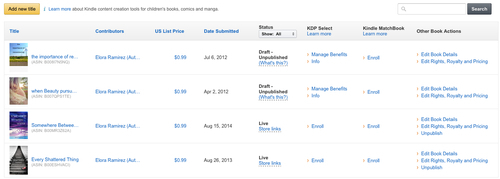
You have the KDP dashboard, where all of your books are located. (See the two not currently published? They never will be seen again, folks. Thank baby Jesus for the un-publish feature).
Setting up a KDP account was so easy.
Go to kdp.amazon.com
Sign in with your amazon account.
Welcome to KDP.
The yellow square that says "add new file" is your next step, and this takes you through all of the questions about pricing, publishing date, and distribution.
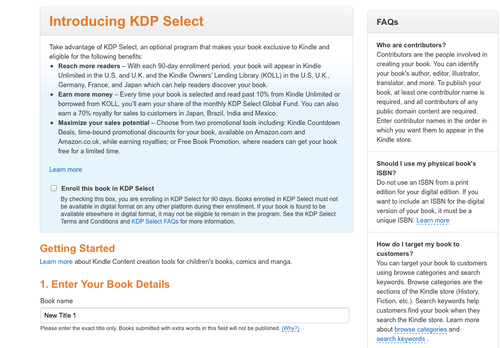
Your book title + a bunch of important pieces of information to your right.
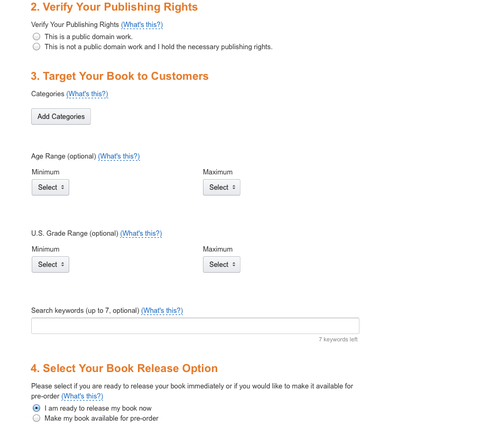
Do you own this book? Do you know the genre? Do you have a release date?
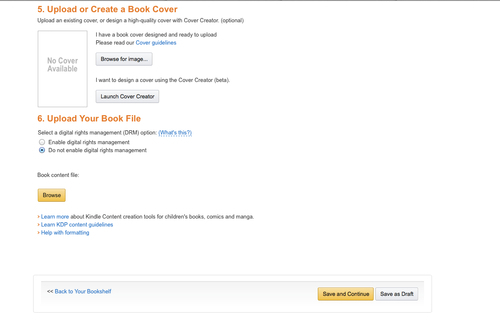
Book cover + manuscript (or other words, OHMIGOSH THIS IS REAL, NOW)
Pro tip: In the second graphic, you see "Release Options" — you want to make your book available for pre-orders. I promise.
One of the biggest things I love about Amazon is their "What's This?" question off to the side of each section — hovering over this link will allow some more information about what they're asking you.
The next page deals with pricing, and here's another hint: if you're using different platforms (and you should because variety and not everyone owns a kindle) uploading books on Nook or iBooks or Kobo first somehow makes Amazon work faster. Not sure why. This is especially true if you're changing the price and making the book cheaper.
We'll talk about choosing the right price later in the month.
As for other platforms, Nook & Kobo just might be the easiest in the world. NookPress even has the option of writing your book within their system, but I haven't tried it. Kobo readers are super-popular in the UK and Canada so if you're wanting to reach a wider audience I'd consider posting your book on their platform.
Of course, there's Smashwords and other websites that offer formatting + distribution to all channels, but for me I've found it's easier to know how KDP, NookPress and KoboLife work in case something goes wrong in the release. I know some people love and swear by Smashwords. I just don't use it.
So what about making your book available in paperback? Createspace is amazing and even offers the Breakthrough Novel Award and free publishing resources. Their process has been so easy both times I've used it for my novels. Once you go through the steps of uploading your manuscript into their system, you'll order a proof and they'll deliver it to you for hands-on editing and proofing.
Another hint: when you find a cover-artist (or if you're creating your cover yourself) make sure they'll be able to give you the proper specs for your paperback.
Once you proof the book and check the box signaling everything is good to go, Createspace works with Amazon on linking your paperback to your .mobi file. And, you can even work backwards and upload to Createspace first and then format your eBook based on the paperback files. I've never done this. But it's an option within their system.
Here's what's important: you can do this. I know that when you first begin to look at everything it's so overwhelming and you don't even know where to begin. We'll talk a little more about this tomorrow. But you can do this. I promise. When I first started putting my work out there, I got lazy and didn't research and refused to learn because I was "too busy" and "it was just an eBook" — resist those thoughts. It's scary, I know. It always is when you're doing something new to you.
But you got this. You'll see. There's nothing like holding your words-that-fill-a-book in your hand.
What other questions do you have about platforms? Let me know. I'd love to answer them in the comments.
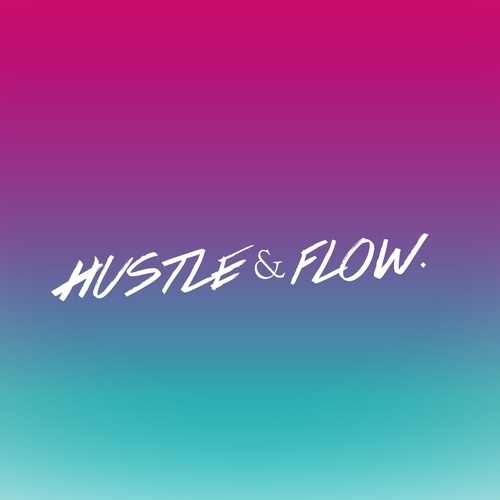
Need more inspiration? Introducing Hustle & Flow: a weekly letter with artistic visioning for the everyday creative. I would love it if you signed up, and I won't ever spam you. Promise.
You'll get hints and anecdotes about getting unstuck and living your most artistic life within the midst of your every day poetics. AND, if you sign up during October, you'll get some special extras dealing with indie-publishing. Come join us?
October 3, 2014
day three: the highs and lows of indie publishing

I remember sitting on my bed waiting for the phone to ring.
"So why is she calling you again? She's talking to you about your book?"
I turned to look at my husband and nodded.
"Yeah. I sent her a copy of the manuscript a few weeks ago and she finished it the other day. Wants to talk to me about it."
I was waiting to talk with K.P. Simmon, owner of InkSlinger PR. At the time, she was also working full time as a teacher and with a publishing house.
Three jobs.
I'd heard about her from a friend, and loved her story of pursuing her dream. And I had mad-respect for anyone who was willing to keep three jobs in order to chase their purpose.
It was January, and Come Alive had been out for four months. On New Years Eve, my agent called to tell me my publisher was shutting its doors.
"You'll get full rights back, though, so we can turn around and self-publish it if you want."
I did want. But there was a problem: I wanted to write another book, and in order to do that I would need to change the not-so-awesome ending of Come Alive.
My conversation with KP would confirm everything in my gut, and I'll talk more about this when we hit the week on editing and revision. What's important here were her words of encouragement for me to do the work and share the book.
"It needs to be read," she told me. "People need this book."
It was all I needed. I started getting excited. I could change the cover! And the title! I could go back through and edit and delete the scenes that made me cringe and develop characters that were way too flat for my liking and really make this the story I wanted to tell from the beginning. I just didn't know what my agent would say about my decision.
A few days after my conversation with KP, and before I could even approach him about my ideas, he sent me an email severing the contract.
"Unfortunately, the current project is not sufficiently lucrative for me to continue representing you..."
This was probably the best thing that could have happened to me in those moments.
The rejection stung. It was the capstone to a season of loss threatening to take me out emotionally and spiritually.
But if he would have kept me around, EVERY SHATTERED THING would never exist.
THE HIGHS AND LOWS OF INDIE PUBLISHINGYesterday, we covered the highs and lows of traditional publishing. Having a team surrounding you as well as {often} gaining the capital to pursue writing full time are a few of the things traditional publishing has going for them.
But the biggest low — lack of control — serves as the biggest high for indie publishing.
I remember sending examples of covers I loved to my publisher before they started working on the design.
"We'll keep these in mind. Thanks."
When I got the specs of the cover, it was nothing like I envisioned. It was too bright. I didn't like the font. There was a huge plus in the poetry off to the side that had a found-poetry/art journal feel to it, but that was even before I edited into the manuscript that Stephanie enjoyed that side of art therapy.
The designer added it because she knew I liked to art journal.
What?
And then, one evening during the summer, there was a rare occasion where I actually received a phone call from executive editor and CEO of the publishing house.
"What kind of flowers are on this tattoo?"
"What?"
"In this scene where Stephanie notices the tattoo — what kind of flowers are those? I think we're going to put some kind of flowers on the pages. You know. To offset the dark subject matter..."
Needless to say, when I found OKAY CREATIONS and began talking with Sarah about the re-release and getting a new cover for EVERY SHATTERED THING, I couldn't believe how perfectly she nailed what was in my brain for the design. She did it again with SOMEWHERE BETWEEN WATER & SKY.
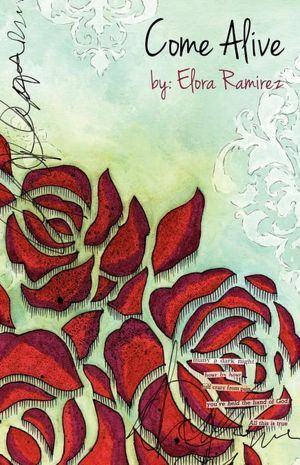
Original cover: no control
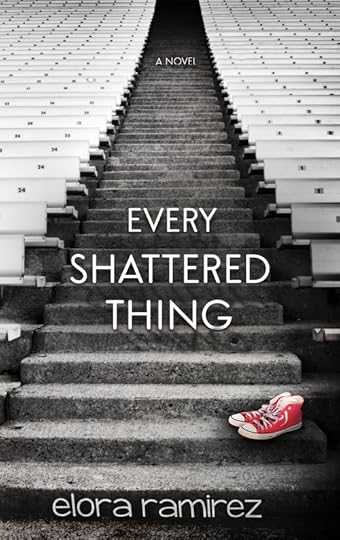
Re-release. Complete control.
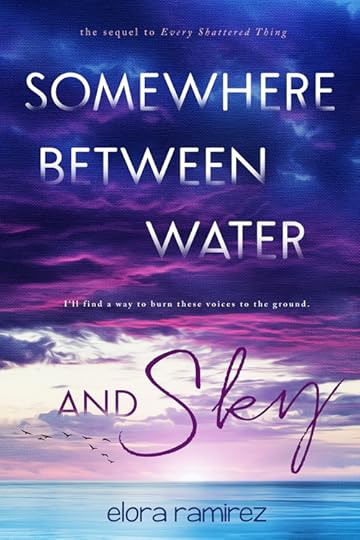
Book two. Complete Control.
With indie publishing, you have complete control. You get to determine what the cover looks like. You get to set the date for your release. You get to decide whether or not you should include a cover reveal tour or hire a PR firm or go at editing alone.
You get to decide the price.
Everything. Everything. Is up for possibility and you are the one in complete control. This can be empowering. It can also be overwhelming.
I didn't know that according to the tax man, authors actually own their own business. When you're traditionally published you often have middle men who help with the financing / checks / royalties. Indie pub?
It's all you.
Suddenly, you're not just a writer. You're a writer, author, designer, publisher, editor, marketer, entrepreneur, book distributor, accountant, the list gets long — fast.
You can hire out. In fact, I recommend it for about half of that list above me. But with complete control comes the very sudden realization that at times, you're going this alone.
It doesn't have to be that way.
Remember: you get to choose.
I hire out my editor + designer + PR people. Amazon's KDP, CreateSpace, Kobo, iBooks and Nook are great book distributors. If you allow time and space for building a team, you can get a great one to support you when times get rough and you want to quit.
Remember K.P. and her encouragement for me to consider rewriting and republishing book one? Back in March, a little over a year after our first phone conversation, she sat on my couch and looked at me.
"Are you writing?" she asked. A small smile played on her lips. "Or are you — you know — just helping people?"
I stared at her for a moment.
"Yeah. I'm not writing..."
She shook her head and raised an eyebrow.
"You know that's not what you're meant to do. Write."
I knew she was right. I knew I had, once again, let others dictate what my days looked like and I was ignoring the pull to begin book two. Fear and doubt and this insane need for permission were permeating everything I created.
I had to stop. I had to remember.
Later that week, with tears in my eyes and a new resolve to not let this story in my bones go to waste, I started the first lines of SOMEWHERE BETWEEN WATER & SKY. I contacted editors. I emailed my cover artist and asked her about availability during the summer. And then I emailed K.P. and began talking dates. I wrote them all down in my calendar before I could think twice about it.
Within two months, the manuscript was completed and sent off to my editor.
You get to choose. That's the most important thing about indie publishing. You get to choose. Whether it's a bad day or one for where nothing makes sense because every single dream you have is coming to fruition, your choices are what got you there.
And you know what? Every moment of these past few years — even the hardest ones — have a tinge of beauty to them because I'm learning how to choose myself.
Isn't it time you did the same?
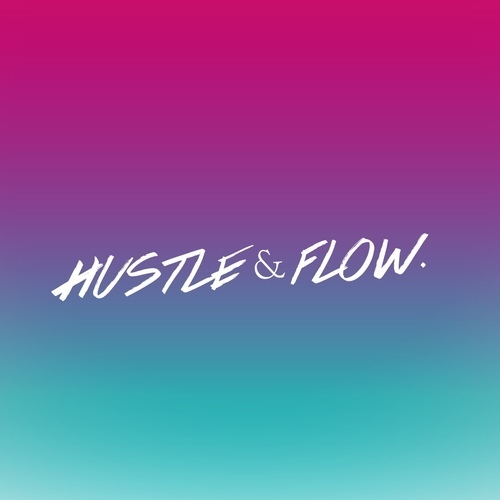
Need more inspiration? Introducing Hustle & Flow: a weekly letter with artistic visioning for the everyday creative. I would love it if you signed up, and I won't ever spam you. Promise.
You'll get hints and anecdotes about getting unstuck and living your most artistic life within the midst of your every day poetics. AND, if you sign up during October, you'll get some special extras dealing with indie-publishing. Come join us?
October 2, 2014
day two: the highs and lows of traditional publishing

When I decided to self-publishing EVERY SHATTERED THING, I knew I wanted to do it right. Going through a traditional publisher has probably always been a dream of mine, and always will be something I hope to accomplish. But my first go-round with a small press left me less than thrilled with lack of information and communication and I was so energized and empowered with the prospect of gaining full creative control over my book.
There was so much I wish I would have known about traditional publishing. So much that would have completely changed my decision to pursue the small press outside of choosing myself and going the indie route.
THE HIGHS AND LOWS OF TRADITIONAL PUBLISHINGWith traditional publishing, it takes about 12-18 months (if you're lucky) from the time you write the book until it's on bookshelves. When I was with the small press, my release date kept getting pushed back without warning. First, it was October of 2011. Then, after reading my revisions and loving the development of characters, they wanted to produce paperbacks as well (good thing!) and so they extended the date to early winter of 2012. Then, there were problems within the production of books or something (I don't even really know) and so it turned into "definitely by the spring."
That's when conversations kind of just stopped happening. I'd go weeks without hearing anything from anyone: my editor, my marketing manager, the director of publishing. Sometime in April, my book appeared on websites to order. A few months after that, a PR agent was hired to assist in releases and we were told all of our books would be pushed back to allow for deeper focus on each manuscript. Sounded good to us, but again: there were no solid dates.
In July, without me knowing, people started receiving their books in the mail. When I found an agent and began actual dialogue with my publisher after months of silence, I was told the release was actually under a soft launch and that the actual date was September of 2012.
My story with them is rare, but it still happens. A few things different for me: I didn't have an agent and was going at the relationship with my publisher alone.
RED FLAG.
Get an agent. Even if you're wanting to publish indie, still consider finding an agent to help you with legal rights conversations way above your level of expertise. Just because you publish your book by yourself doesn't mean you won't receive emails and hits from acquisition editors. Be ready. Have an agent.
Also, when I agreed to publish with this press I never received a contract.
Hello.
I roll my eyes at that now, because not receiving a contract is probably a huge indicator that sister, you're never gonna get any royalty out of this deal. And I didn't. But I was so keyed up about actually having my book on book shelves I wasn't paying attention to the intricacies of business. Find an agent. They'll spot the scary ones and won't even touch them with a ten foot pole.
So you don't have control over the publishing calendar (how long it takes to edit, the time in between you revising and them sending back notes, developing a marketing plan, etc), and you don't have control over release dates. You also don't have control over pricing.
I've had a more than a few friends frustrated over the price of their eBooks. Most of these people have experience with indie publishing and so they know that freedom of setting the price that fits best for their audience as well as the occasional sale. In traditional publishing, you don't decide the price of your book, the publisher does.
Which brings up the next point: when I say publisher, what does that mean? It means an entire team behind you —
agent
editors
editorial assistants
copy editors
designers
publicists
These aren't bad people. In fact, having a team on your side is actually really, really nice when it comes to allowing them to assist in getting your story out into the world. It's just, aside from your agent, you often don't have any choice on who you work with in the publishing process. Typically, an acquisition editor is who originally saw your work (or is one of the first people who began actively fighting for your manuscript within the publishing house). If it's not them it's the editorial assistants. Either way, if you're lucky these will be a built in support system during the process.
Probably the biggest lure in traditional publishing is the advance. I didn't get an advance with the small press I signed with in 2011, but again: my story is not your usual-run-of-the-mill-publishing-story.
Advances are definitely a bonus in pursuing traditional publishing and take away a lot of the guess work in how much you'll make once the book is published. However, just because you get offered an advance doesn't mean you're going to be rolling in the green. Most advances aren't massive lump sums of cash. An advance is an investment on the publisher's part — a calculated risk on the potential they see in your book. You don't get it all at once. Often installments are agreed upon and you receive the payments after certain perimeters are met within the writing / publishing process.
I've had friends land book deals with advances around 20k, and I have had friends with book deals in the six figures. And before you freak at the amount of money I just wrote, consider this: advances cover the entirety of the publishing process (and often) include multi-book deals. So it's not just this book you're getting paid for — it's the entire series. Or this standalone and another standalone you're expected to write once this one is published.
Puts things in perspective.
Nothing is set in stone with how much you can receive as an advance. If you have an agent, this is why you'll often hear about wanting to have multiple publishing houses say yes to your manuscript so a bidding war occurs. Bidding wars are good and beautiful things for an author because it means higher advances. Whatever you make, whether it's significant or simply helps you pay the electricity while you write, having capital going into the process means less stress, especially after the weeks or months you've spent negotiating the deal.
Finally, the industry is changing at lightning speed. In his book APE: How to Publish a Book, Guy Kawasaki mentions that it wasn't until 1777 that books were even sold and the only people who could sell them were members of this elite book selling guild. Royalties didn't enter the picture until the 1830s. And in the 1900s, when a man began sharing his idea of the paperback book, people laughed.
A publisher finally said yes, but only because they wanted to prove him wrong.
And in the dawn of self-publishing, literary houses scoffed at the idea that regular humans could choose to sell their books and not wait for the gatekeepers to say they were good enough.
Now who's laughing? E.L. James, author of Fifty Shades of Grey, began her career publishing fan- fiction through Amazon's KDP. She now is the highest grossing author in history, having passed literary greats like JK Rowling and Stephen King. And she's not the only success story. Every day I hear about someone else who wrote the book and hit publish and watched their dreams come true.
There is absolutely nothing wrong with traditional publishing. I said it at the beginning and I'll say it again: it's still a goal of mine to get a book deal. But until then? What of the stories I have waiting? The ones that get me all breathy-with-excitement because these are books I would want to read?
Here's what I know: you can either sit on your hands and wait for someone to say you're good, I want you. Or, you can go ahead and write the story you're meant to write and then share it with the world, no wait-time or permission needed.
What will you decide?
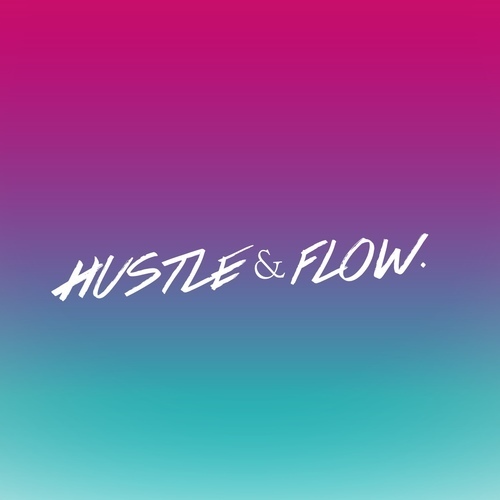
Need more inspiration? Introducing Hustle & Flow: a weekly letter with artistic visioning for the everyday creative. I would love it if you signed up, and I won't ever spam you. Promise.
You'll get hints and anecdotes about getting unstuck and living your most artistic life within the midst of your every day poetics. AND, if you sign up during October, you'll get some special extras dealing with indie-publishing. Come join us?
October 1, 2014
day one: knowing your why

I did it for myself alone, not for anyone else, and that was the difference. It didn't matter if I found the words, and more than that, I knew it would be impossible to find the right ones. And because I accepted that what I'd once believed was possible was in fact possible, and because I knew I would never show a word of it to anyone, I wrote a sentence.
- Nicole Krauss, History of Love
You must be sure that your imagination and love are behind it, that you are not working just from grim resolution, i.e., to make money or impress people.
- Brenna Ueland, If You Want to Write
I have a confession to make.
Before any of this started for me, I would watch other writers push out their work on Amazon or their own website and think, well that's not hard. I can do that — I can write just as good as they can.
(Pause for the dramatic irony over the horrific grammar)
It's true, though. I saw the finished product, all nice and neat and fitting perfectly on my kindle or computer screen, and something would settle on my chest. Something that felt an awful lot like jealousy. Something that looked an awful lot like comparison.
Hear me: this is so dangerous. It's not cute or helpful or worth any moment of your time to compare someone else's words with what you believe you can or can't accomplish. For a hot minute, my reasons for getting into this whole indie scene weren't founded in telling stories well and writing what I know I'm meant to write.
It was about competition.
It was about making as much money as possible.
It was about fame.
It was about writing what I thought others wanted to hear.
And maybe a tiny sliver, just one breath of a moment, did I think this is the story I'm meant to tell.
I think I sold about 100 copies, with a majority of those downloaded within a KDP promotion where my book was absolutely free. Most of those I competed against? Multi-book publishing deals. Bestsellers. Household names.
But they weren't writing against me. They probably didn't even know I held this deeply rooted jealousy where I just wanted to beat them.
They were too busy writing from their why.
Before you research, before you jump into the narrative bouncing around those bones of yours, before you begin to tell others that you're writing a book and you plan on publishing it, you gotta know your why.
I know what you're thinking. You're seeing all of these people publish their own work and you're feeling the dissonance growing because you know you can do it. You know you have book(s) inside and you're tired of waiting for others to choose you. You know it's time to choose yourself.
I'm with you.
But first.
Close your eyes. Let the breath fill your lungs.
What is your why?
Answer this question and your words will show depth and purpose. When we work from our core, we turn magnetic. People gravitate toward what we're doing not because we're hollering for attention but because our work speaks for itself in the intention and soul seen within the pages.
Find your why, and then write fire.
Don't settle for anything less.
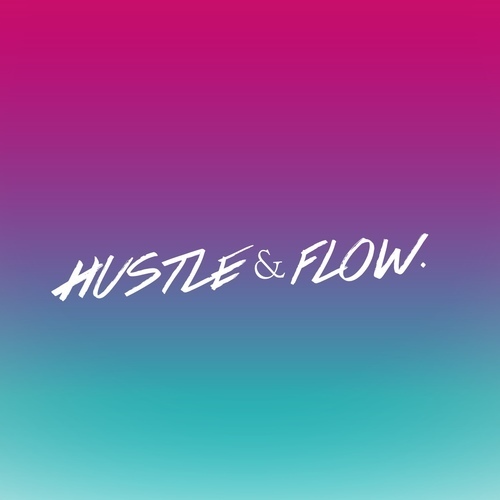
Need more inspiration? Introducing Hustle & Flow: a weekly letter with artistic visioning for the everyday creative. I would love it if you signed up, and I won't ever spam you. Promise.
You'll get hints and anecdotes about getting unstuck and living your most artistic life within the midst of your every day poetics. AND, if you sign up during October, you'll get some special extras dealing with indie-publishing. Come join us?
September 29, 2014
Coming This Week: 31 days of indie publishing

Everyone was publishing an eBook.
Manifestos. How to Manuals. Encouragement. Mini-Memoirs. Individual Studies. Every time I turned around, a new one was being released.
I figured if they were doing it, why not? I wrote a thing about beauty pursuing you in the midst of grief and pain. I got a friend to make me a really pretty cover. I exported the file to PDF, uploaded it to Amazon, and waited.
It was 2011, and I had no idea what the hell I was doing publishing a book by myself.
Fast forward a few months and I'm knee deep in editing and learning what it means to have a working relationship with a publisher that isn't necessarily....well, working. Come Alive is released without any fanfare, people are receiving my paperback without me even knowing it's available, and the control has completely left my side of the equation.
I didn't like it. Mostly because I didn't get paid.
All of the work — all of the blood, sweat, tears, and doubt — I had nothing to show for it except a bruised ego and a book taken off the shelves.
But fate has a way of turning things around, and after a conversation with a friend who believed in my book and knew a thing or two about indie publishing for fiction, I jumped heart first into learning everything I needed to know to get this story out into the world.
I've published two books since then, four books total if you count my eBook and short story collection (those are both off of Amazon, thankyouverymuch).
I think back to everything I've learned — the formatting, the wait time, the calendars, the writing tips, the crash course of running a publishing business out of your living room or office. It can be overwhelming.
But that doesn't mean your story doesn't need to be told.
You can get that story out. I promise. Over the next 31 days, I'll show you how.
And if you're a subscriber to Hustle & Flow, my weekly encouragement to creatives, you'll receive some special surprises along the way.
Here's the schedule >>
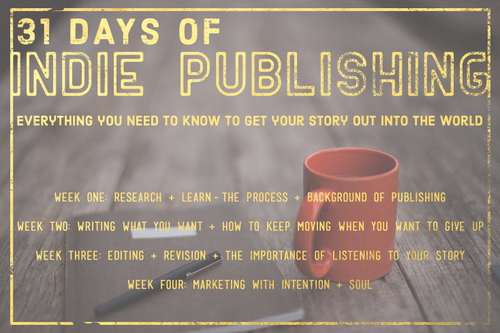
What would happen if I told you that you have everything you need to get that story burning in your bones out into the world? Would you do it?
I hope you will.
Here's to 31 days of finding out how.
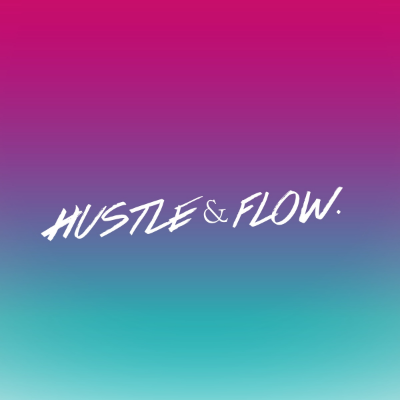
Need more inspiration? Introducing Hustle & Flow: a weekly letter with artistic visioning for the everyday creative. I would love it if you signed up, and I won't ever spam you. Promise.
You'll get hints and anecdotes about getting unstuck and living your most artistic life within the midst of your every day poetics. Come join us?
September 19, 2014
when writing is not glamorous.
Yesterday, I published a book.
I woke up like I do every morning, my dog whining and looking at me with her eyes reserved for pleading that she needed to go outside.
When I came back inside, I worked a little in making sure links were where they needed to be and thanked a few people for sharing the Amazon page and then realized: it's been an hour. I haven't eaten. I should probably do that.
Here's where I tell you it's been a pretty rough week. This summer has kicked my husband and I around a few times, and September has been no exception. However, when I started making macaroni and cheese and realized we didn't have any milk only after boiling the noodles, I may have lost it a little bit.
Like, screamed the f-word a few times and threw the noodles down the disposal and then made myself some nachos out of generic cheese and stale tortilla chips.
Last night, my husband and I ate leftovers and watched Criminal Minds and I tried to keep from refreshing the Amazon page to watch my ranking. (This is a horrible idea, by the way. Stay far away from the refresh button on your release day. Stay far away from the internet, really).
This is not how I imagined release days when I started thinking hey, I may want to write a book or two.To me, release days looked like popped champagne and copious amounts of celebration. It looked like a table full of your book(s) and friends and family and those who read your writing gathered around, cheering you on as you sign copies.
It did not look like a mix of ugly crying (because vulnerability) and desperation (because where are the reviews? will anyone leave a review? what about the reviews?) and joy (ohmigosh I did it. I published another book. THOSE ARE MY WORDS AND PEOPLE ARE READING THEM AND I PUBLISHED ANOTHER BOOK).
This post is a dose of reality.
Pursuing your dream, in whatever form, is hard. Some days, it kind of sucks. Like, there-are-no-more-groceries-and-pay-day-is-tomorrow-and-our-car-needs-repaired-and-how-will-we-make-rent sucks.
But here's the secret, and I need you to pay attention: life doesn't have to be glamorous in order to be beautiful.Living the life that aligns with your purpose isn't always easy. Most times it kind of makes you want to quit. But the brilliancy of pushing through and doing it anyways because you love it is what makes everything worth it in the end.
Before I went to bed last night, I received a message from a friend who finished reading Somewhere Between Water & Sky — thank you for writing hope, she said.
I smiled.
Mission: complete.
September 14, 2014
prostituting the sacred.
A few months ago, I received this question from a reader: What would you tell a writer who wants to write and create and be artistic but doesn't exactly know how to figure out what her specific bent is? Suppose that one is a spiritual writer, then how does one come to terms with the desire to create good content, original art (even if not artistically inclined), and be true to not just their spirituality but to her God without feeling as though one might be prostituting the gift, the call, the talent, or the sacred?
This is my response.
I'm thinking of Flannery O'Connor. I'm thinking of the way she captured the Southern gothic without flinching and wrote of the difficulty of finding good men, the impaired view of racism, the all-too quick way we trust others and lose our leg.
In her prayer journals, O'Connor is noted to having lived in "a deeply human world." Her fiction echoed this belief and yet, in her private pages, she begs for deeper meaning — for more stories — to get down under things and find where You are (4). It was a circle: her writing influenced her prayers, and her prayers influenced her writing.
You ask how to be true — not only to your spirituality but also to your God. I ask, do they have to be separate?
When I was writing Come Alive, the original draft of Every Shattered Thing, I ended it much like the books of my childhood: clean, pretty, spiritual. That particular scene was very much where I was at personally in my own working through of memories and hurts.
But it wasn't the answer for a deeply human world. I knew almost immediately I'd done wrong to the character, and when I got my rights back from the original publisher, the ending was the first thing I changed. Stephanie's reaction to Kevin is very much born out of her need for deep trust. The more I thought about it, the more I realized: even the first ending, created out of my own psyche and processing, would not hold true to how I would react had I been in Stephanie's exact position. In fact, regardless of my beliefs, I very much would turn and run.
This is my calling: stay true to my beliefs in word and deed and show the realism of a deeply human world that longs for an even deeper hope.
I prostitute the sacred when I overstep my bounds and spell it out for my reader. I prostitute the sacred when I don't write, don't read, don't enjoy the artistry around me even though it pulses in my veins. Painting is my worship. Art journaling is my prayer. Writing is my witness.
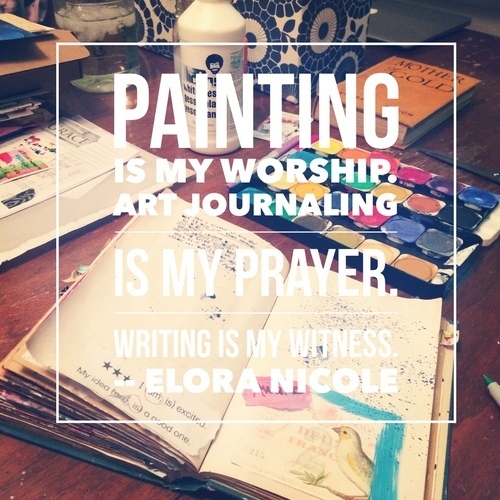
There will be different levels of conviction for different people. For me, spirituality and God are interwoven into this mystical fabric of being. I cannot separate my thoughts from the Spirit — I cannot move away from His presence — I cannot forget about how I'm held in the darkest of nights. To cut that away from me would be to maim me irreparably. I may not write explicitly spiritual pieces of literature, but every word is irrevocably spiritual.
What I'm saying is this: you don't have to write about faith in order for your faith to be seen.
But what is most important is that you answer this question for yourself. When do you feel as if you're prostituting the gift you've been given? When do you know you've crossed a line in which you feel uncomfortable? We all have different stories, each of them wild and begging for attention. Listen to yours. Keep your eyes on your page.
Your Spirit will know what to say.
September 9, 2014
The Check Yes Tour :: Who is Your Jessa?

Jessa came to me in the middle of my sister's bachelorette party.
I was sitting next to one of Blanche's best friends and she was telling me this story about chasing the sunrise up a flight of stairs after a horrible break-up. It was a simple story born out of a beautiful friendship, and things just sort of clicked into place. I knew even then that there would be a scene in book two that centered on this incredible friendship between two characters and their fight to believe in the hope of another day.
Stephanie needed someone who believed in the possibilities of beauty and hope winning out in the end not because this person felt sorry for her, but because she genuinely liked her. There was no catch in their relationship — no hidden motive. It was the only way Stephanie would be able to truly heal, really. She had to experience relationships that weren't based on a level of currency (whether it be actual currency or the currency of love).
Enter Jessa.
.::.
With eight days before the release of SOMEWHERE BETWEEN WATER AND SKY, I want to take a moment to celebrate those friendships in our lives that have meant something. For me, there are numerous memories that served in the completion of this novel.
A few years ago I road tripped with one of my closest friends. It was on that trip I first encountered Sunset Cliffs and saw Diane Keaton on the pier. We even ran into a traveling poet, although his name wasn't Fitz and I didn't get a poem (a decision I regret to this day). I fell in love with Southern California, and as I stood on the edge of the world and watched the waves crash beneath me, a girl walked up behind us and climbed down into a hidden cave and pulled out her journal to write. I remember grabbing my friend's arm.
"Ohmigod. That's Stephanie. That's Stephanie. I don't know how I know it but I know it...I'm kinda freaking out right now."
I'm still thankful for Prudence not using that moment to solidify my lunacy, but actually believing me and joining in with the train of thought.
"Take a picture," she said. "You'll want to remember this moment when you write book two."
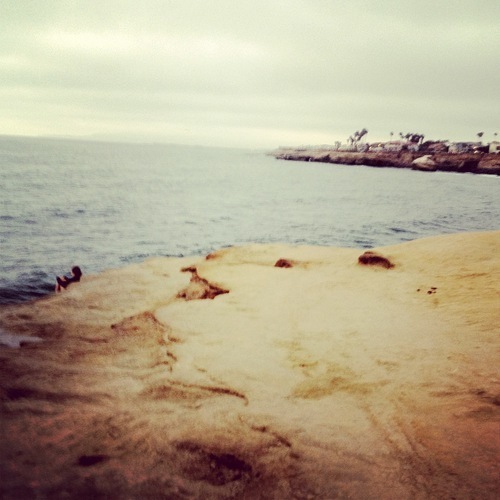
.::.
She was in my kitchen getting lessons in chicken-management. Russ walked away for a moment, and I took the chance to take advantage of the extra space and fill up my drink.
I was turning away when her fingers wrapped around my wrist. She opened her mouth, paused, and then nodded before finally speaking, a trait I've come to know as her brief moment of making sure this is the right and good thing to say.
"I was talking to someone about you the other day, and in mentioning your name, I said 'one of my best friends, Elora Ramirez' and that got me thinking, you know? And I realized that yeah. You're one of my best friends. And I'm thankful."
I'm fairly certain I won the award for awkward response, because I can't for the life of me remember what I said, but I do remember being deeply moved by the way in which our friendship jumped to another level of trust and camaraderie after that moment because how did she know? I was labeling her the same way, although not publicly, and definitely not in a way I even realized until she said the words.
To this day, when I'm needing a dose of truth, or even if it's a moment of bathing in the sun with a thermos full of blackberry soda and vodka, I know I can go to Ritz.
.::.
We were huddled together, shivering in the brisk late evening air of November. The moon was almost right above us and our hands were shaking (although you could debate whether this was from the cold or the lavender liqueur).
"I just need you to know I have trouble connecting with people because I'm afraid they're going to leave me."
I stopped cold at her words, not really knowing what to say. This was the one who brought a greasy hamburger, french fries and a milkshake to my house during the worst week of my life. In my head, we already kind of went together, and so to hear this fear surprised me in a way I wasn't anticipating.
How did you know this was my fear too? was what was running through my head, but what came out of my mouth (and proved to be it's own prophetic word) was "you don't have to worry about me. I'm not going anywhere."
Three months later, I'm leaving her house after her birthday party and she grabs my hands and looks me in the eyes.
"Where you go, I would go. I would move wherever you moved...." she smiled. "I mean, within reason."
I think, in this moment I knew what it meant to have a person.
When I'm flailing or losing momentum or lost in my own mind, I'll go to Sarah. She's a buoy who holds up the mirror when I need it the most.
.::.
There are other moments for sure — the walks along Jekyll Island where I first learned of storm wood, the miles spent driving up and down I-35 and other highways in order to attend a book signing of an author I respect, the numerous tattoo stories and emails and moments of connection.
But I want to hear your story. How has friendship changed you? Who is your person? What are the moments in which you and those closest to you chased the sunset or made an impulsive decision in order to suck the marrow out of life? Tell me. Use the Check Yes graphic above in your post if you like.
And then come back here and link up your post so we can remember the beauty of relationships around us. All I ask is that you include the Amazon link for SOMEWHERE BETWEEN WATER AND SKY somewhere in your post. And, if you've read the book, I'd love to hear how Jessa and Stephanie's relationship have inspired you.
September 5, 2014
the magic of human moments.
...I keep thinking too of the more conventional wisdom: namely, that the pursuit of pure beauty is a trap, a fast track to bitterness and sorrow, that beauty has to be wedded to something more meaningful.
I purchased The Goldfinch almost a year ago. I kept seeing it everywhere — in bookstores, on the bestseller list, in book reviews, in passing snapshots on Instagram. I one-clicked it knowing I didn't really have time for a sweeping narrative. It didn't really matter. The book was on sale and I knew I would read it eventually.
I read it last week.
I started slow. Donna Tartt's writing has been noted as Dickensonian, and I could see the parallels early in the book. Tartt begins with Theo, the main character and narrator, hallucinating after a particularly rough patch in Amsterdam. He sees his mother, and immediately grows nostalgic. The scene is set, and we're taken back to when he is 13 and worried about discipline waiting for him at school.
But in that beginning section? Sentences stretched for almost an entire page. I'm all for grand syntax—Nathaniel Hawthorne comes to mind—but I wasn't entirely sold.
Until the terrorist attack where his mother died and he acquired the painting.
There were at least a dozen people on the floor—not all of them intact. They had the appearance of having been dropped from a great height. Three or four of the bodies were partially covered with fireman's coats, feet sticking out. Others sprawled glaringly in the open, amidst explosive stains. The splashes and burns carried a violence, like big blood sneezes, an hysterical sense of movement in the stillness.
Something shifted within this scene for me—maybe because it wasn't written in the voice of a drug-induced surrealism. The description came alive and never really stopped throughout the novel. The characters weren't flat, and even if I didn't necessarily feel an emotional connection to them, I could see them living and breathing in my head while reading.
Especially Boris. But I liked him, dreg that he is.
As I got into the story, I realized what it was that struck me about Tartt's writing style—what worked for me and what I knew I would be taking away from her words.
She captures the magic of ordinary human moments.
More than any other book I've read before, this one nails the marking of time when your life is altered—the this time last week I was here or she was doing this or ast time I opened this we were talking face-to-face. The study of your surroundings, the honing in on the worn detail of your shoe rather than paying attention to one more person asking how you are doing.
You know. The things we think about when our life has taken the sharp left of change.
And that's not all. Theo, in a way, is an anti-hero. Very early we realize there's not much redeemable about this kid. The death of his mother and subsequently the painting coming into his possession serve as catalysts that push him forward. It's not until the last 20 or so pages that he really begins waking up and living — and by then, he's an adult.
But this is life.
The Goldfinch wasn't a pretty book. Sure. There were some incredible moments when Theo speaks of the perils of beauty unattached—those obsessions we get under our skin that don't really hold any weight. Those are the most dangerous, he believes, because there's nothing to them. No substance. But for the other 700 or so pages, it's situation after situation where he's just living. Just getting by—just scraping one more pill into his mouth and figuring out how to make it to his next conversation with Pippa, his own version of a manic-pixie-dream-girl who happened to be in the museum and one of the only other survivors of the attack.
I loved this.
Grief changes you. Brush up against it and you won't come away unscathed. And to experience such repeated loss, and to have the closest relationships be tainted with abuse, addiction and co-dependency, I would expect nothing less than how Theo reacted in any given moment.
He was relentlessly human, and Tartt wrote him with scathing grace. Because there is grace —even for those who've experienced the darkest of humanity. Ultimately, this is the choice Theo faces: risk everything and pursue the beauty that matters, or go by the minute for the thrill of the next high.
His choice, to me, made perfect sense.

